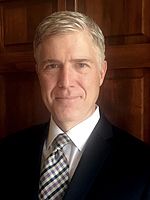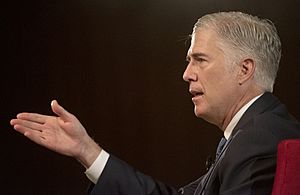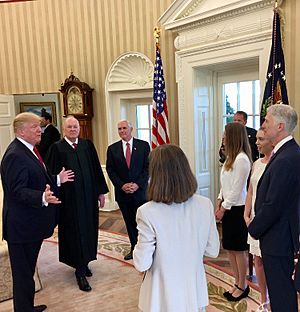Neil Gorsuch facts for kids
Quick facts for kids
Neil Gorsuch
|
|
|---|---|
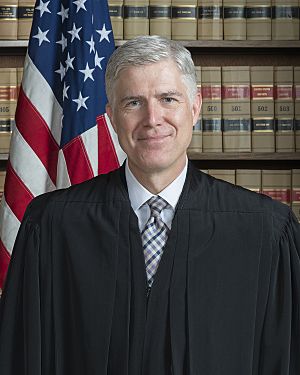
Official portrait, 2017
|
|
| Associate Justice of the Supreme Court of the United States | |
| Assumed office April 10, 2017 |
|
| Nominated by | Donald Trump |
| Preceded by | Antonin Scalia |
| Judge of the United States Court of Appeals for the Tenth Circuit | |
| In office August 8, 2006 – April 9, 2017 |
|
| Nominated by | George W. Bush |
| Preceded by | David M. Ebel |
| Succeeded by | Allison H. Eid |
| Principal Deputy Associate Attorney General |
|
| In office June 2005 – July 2006 |
|
| Attorney General | John Ashcroft |
| Personal details | |
| Born |
Neil McGill Gorsuch
August 29, 1967 Denver, Colorado, U.S. |
| Spouse |
Louise Burleston
(m. 1996) |
| Education | |
| Signature | |
| Scientific career | |
| Doctoral advisor | John Finnis |
| Other academic advisors | Timothy Endicott |
Neil McGill Gorsuch (/ˈɡɔːrsʌtʃ/ GOR-sutch; born August 29, 1967) is an American jurist who serves as an associate justice of the Supreme Court of the United States. He was nominated by President Donald Trump on January 31, 2017, and has served since April 10, 2017.
Gorsuch spent his early life in Denver, Colorado, then lived in Bethesda, Maryland, while attending Georgetown Preparatory School. Upon graduating, he matriculated at Columbia University, where he became an established writer. Gorsuch received his legal education at Harvard Law School and in 1993, after 15 years as a practicing attorney, obtained a Doctor of Philosophy in jurisprudence from the University of Oxford on a Marshall Scholarship.
From 1995 to 2005, Gorsuch was in private practice with the law firm of Kellogg, Hansen, Todd, Figel & Frederick. He was the principal deputy associate attorney general at the United States Department of Justice from 2005 until his appointment to the Tenth Circuit. President George W. Bush nominated Gorsuch to the United States Court of Appeals for the Tenth Circuit on May 10, 2006, to replace Judge David M. Ebel, who achieved senior status that same year.
Gorsuch is a proponent of textualism in statutory interpretation and originalism in interpreting the United States Constitution. Along with Justice Clarence Thomas, he is an advocate of natural law jurisprudence. Gorsuch clerked for Judge David B. Sentelle of the U.S. Court of Appeals for the D.C. Circuit from 1991 to 1992 and U.S. Supreme Court justices Byron White and Anthony Kennedy from 1993 to 1994. He is the first Supreme Court justice to serve alongside a justice for whom he once clerked (Kennedy). During his tenure on the Supreme Court he has written the majority opinion in landmark cases such as Bostock v. Clayton County on LGBT rights, McGirt v. Oklahoma on Native American law, Kennedy v. Bremerton School District on personal religious observance, 303 Creative LLC v. Elenis on free speech, and Ramos v. Louisiana on juries' guilty verdicts.
Contents
Early life and education
Gorsuch was born on August 29, 1967, in Denver, Colorado, to Anne Gorsuch Burford (née McGill; 1942–2004) and David Ronald Gorsuch (1937–2001). He was the eldest of three children, and is a fourth-generation Coloradan. Both of Gorsuch's parents were lawyers, and his mother served in the Colorado House of Representatives from 1976 to 1980. In 1981, she was appointed by President Ronald Reagan to be the administrator of the U.S. Environmental Protection Agency, becoming the first woman to hold that position. At his mother's appointment, Gorsuch's family moved to Bethesda, Maryland. He attended Georgetown Preparatory School, a prestigious Jesuit prep school, where he was two years junior to Brett Kavanaugh, alongside whom he later clerked at the Supreme Court and eventually served as a Supreme Court justice. While attending Georgetown Prep, Gorsuch served as a United States Senate page in the early 1980s. He graduated from Georgetown Prep in 1985.
After high school, Gorsuch attended Columbia University and graduated cum laude in 1988 with a Bachelor of Arts degree in political science. While at Columbia, Gorsuch was inducted into Phi Beta Kappa. He was also a member of Phi Gamma Delta fraternity. As an undergraduate student, he wrote for the Columbia Daily Spectator student newspaper. In 1986, he co-founded the alternative Columbia student newspaper The Fed.
Gorsuch then attended Harvard Law School, receiving a Harry S. Truman Scholarship to attend. He was described as a committed conservative who supported the Gulf War and congressional term limits on "a campus full of ardent liberals". Former President Barack Obama was one of Gorsuch's classmates at Harvard Law. Gorsuch was an editor of the Harvard Journal of Law and Public Policy, and graduated from Harvard Law in 1991 with a Juris Doctor cum laude.
In 2004, Gorsuch received a Doctor of Philosophy in law (legal philosophy) from the University of Oxford. A Marshall Scholarship enabled him to study at Oxford in 1992–93, where he was supervised by the natural law philosopher John Finnis of University College, Oxford. His thesis was also supervised by Professor Timothy Endicott of Balliol College, Oxford. In 1996, Gorsuch married Louise, an Englishwoman and champion equestrienne on Oxford's riding team whom he met during his stay there.
Early legal career
Clerkships
Gorsuch served as a law clerk for Judge David B. Sentelle of the United States Court of Appeals for the D.C. Circuit from 1991 to 1992. After spending a year at Oxford as a Marshall Scholar, Gorsuch clerked for Supreme Court Justices Byron White and Anthony Kennedy from 1993 to 1994. His work with White occurred right after White retired from the Supreme Court; therefore, Gorsuch assisted White with his work on the Tenth Circuit, where White sat by designation. Gorsuch was part of a group of five law clerks assigned that year that included Brett Kavanaugh, who described Gorsuch at the time, saying: "He fit into the place very easily. He's just an easy guy to get along with. He doesn't have sharp elbows. We had a wide range of views, but we all really got along well."
Private law practice
Instead of joining an established law firm, Gorsuch decided to join the two-year-old boutique firm Kellogg, Huber, Hansen, Todd, Evans & Figel (now Kellogg, Hansen, Todd, Figel & Frederick), where he focused on trial work. After winning his first trial as lead attorney, a jury member told Gorsuch he was like Perry Mason. He was an associate in the Washington, D.C., law firm from 1995 to 1997 and a partner from 1998 to 2005. Gorsuch's clients included Colorado billionaire Philip Anschutz. At Kellogg Huber, Gorsuch focused on commercial matters, including contracts, antitrust, RICO, and securities fraud.
In 2002, Gorsuch wrote an op-ed criticizing the Senate for delaying the nominations of Merrick Garland and John Roberts to the United States Court of Appeals for the District of Columbia Circuit, writing, "the most impressive judicial nominees are grossly mistreated" by the Senate.
In 2005, at Kellogg Huber, Gorsuch wrote a brief denouncing class action lawsuits by attorneys on behalf of shareholders. In the case of Dura Pharmaceuticals, Inc. v. Broudo, Gorsuch opined, "The free ride to fast riches enjoyed by securities class action attorneys in recent years appeared to hit a speed bump" and "the problem is that securities fraud litigation imposes an enormous toll on the economy, affecting virtually every public corporation in America at one time or another and costing businesses billions of dollars in settlements every year".
U.S. Department of Justice
Gorsuch served as Principal Deputy to the Associate Attorney General, Robert McCallum, at the United States Department of Justice from 2005 until 2006. As McCallum's principal deputy, he assisted in managing the Department of Justice's civil litigation components, which included the antitrust, civil, civil rights, environment, and tax divisions.
While managing the United States Department of Justice Civil Division, Gorsuch was tasked with all the "terror litigation" arising from the president's War on Terror, successfully defending the extraordinary rendition of Khalid El-Masri, and, in November 2005, traveling to inspect the Guantanamo Bay detention camp.
Gorsuch helped Attorney General Alberto Gonzales prepare for hearings after the public revelation of NSA warrantless surveillance (2001–07), and worked with Senator Lindsey Graham in drafting the provisions in the Detainee Treatment Act that attempted to strip federal courts of jurisdiction over the detainees.
U.S. Court of Appeals for the Tenth Circuit (2006–2017)
In January 2006, Philip Anschutz recommended Gorsuch's nomination to Colorado's U.S. senator Wayne Allard and White House Counsel Harriet Miers. On May 10, 2006, President George W. Bush nominated Gorsuch to the seat on the U.S. Court of Appeals for the Tenth Circuit vacated by Judge David M. Ebel, who was taking senior status. Like Ebel, Gorsuch was a former clerk of Justice White. The American Bar Association's Standing Committee on the Federal Judiciary unanimously rated him "well qualified" in 2006.
On July 20, 2006, Gorsuch was confirmed by unanimous voice vote in the U.S. Senate. He was Bush's fifth appointment to the Tenth Circuit. When Gorsuch began his tenure at Denver's Byron White United States Courthouse, Justice Kennedy administered the oath of office.
During his time on the Tenth Circuit, ten of Gorsuch's law clerks went on to become Supreme Court clerks, and he was sometimes regarded as a "feeder judge". One of his former clerks, Jonathan Papik, became an associate justice of the Nebraska Supreme Court in 2018.
Freedom of religion
Gorsuch advocates a broad definition of religious freedom that is inimical to church–state separation advocates.
In Pleasant Grove City v. Summum (2007), he joined Judge Michael W. McConnell's dissent from the denial of rehearing en banc, taking the view that the government's display of a donated Ten Commandments monument in a public park did not obligate the government to display other offered monuments. The Supreme Court subsequently adopted most of the dissent's view, reversing the Tenth Circuit's judgment. Gorsuch has written, "the law [...] doesn't just apply to protect popular religious beliefs: it does perhaps its most important work in protecting unpopular religious beliefs, vindicating this nation's long-held aspiration to serve as a refuge of religious tolerance".
Administrative law
Gorsuch has called for reconsideration of Chevron U.S.A., Inc. v. Natural Resources Defense Council, Inc. (1984), in which the Supreme Court instructed courts to grant deference to federal agencies' interpretation of ambiguous laws and regulations. In Gutierrez-Brizuela v. Lynch (2016), Gorsuch wrote for a unanimous panel finding that court review was required before an executive agency could reject the circuit court's interpretation of an immigration law.
Alone, Gorsuch added a concurring opinion, criticizing Chevron deference and National Cable & Telecommunications Ass'n v. Brand X Internet Services (2005) as an "abdication of judicial duty" and writing that deference is "more than a little difficult to square with the Constitution of the framers' design".
Interstate commerce
Gorsuch has been an opponent of the dormant Commerce Clause, which allows state laws to be declared unconstitutional if they too greatly burden interstate commerce. In 2011, Gorsuch joined a unanimous panel finding that the dormant Commerce Clause did not prevent the Oklahoma Water Resources Board from blocking water exports to Texas. A unanimous Supreme Court affirmed that ruling in Tarrant Regional Water District v. Herrmann (2013).
In 2013, Gorsuch joined a unanimous panel finding that federal courts could not hear a challenge to Colorado's internet sales tax. A unanimous Supreme Court reversed that ruling in Direct Marketing Ass'n v. Brohl (2015). In 2016, the Tenth Circuit panel rejected the challenger's dormant commerce clause claim, with Gorsuch writing a concurrence.
In Energy and Environmental Legal Institute v. Joshua Epel (2015), Gorsuch held that Colorado's mandates for renewable energy did not violate the commerce clause by putting out-of-state coal companies at a disadvantage. He wrote that the Colorado renewable energy law "isn't a price-control statute, it doesn't link prices paid in Colorado with those paid out of state, and it does not discriminate against out-of-staters".
Campaign finance
In Riddle v. Hickenlooper (2014), Gorsuch joined a unanimous panel of the Tenth Circuit in finding that it was unconstitutional for a Colorado law to set the limit on donations for write-in candidates at half the amount for major party candidates. He added a concurrence noting that although the standard of review of campaign finance in the United States is unclear, the Colorado law would fail even under intermediate scrutiny.
Civil rights
In A.M. v. Holmes (2016), the Tenth Circuit considered a case in which a 13-year-old child was arrested for burping and laughing in gym class. The child was handcuffed and arrested based on a New Mexico statute that makes it a misdemeanor to disrupt school activities. The child's family brought a federal § 1983 civil rights action against school officials and the school resource officer who made the arrest, arguing that it was a false arrest that violated the child's constitutional rights. In a 94-page majority opinion, the Tenth Circuit held that the defendants enjoyed qualified immunity from suit. Gorsuch wrote a four-page dissent, arguing that the New Mexico Court of Appeals had "long ago alerted law enforcement" that the statute that the officer relied upon for the child's arrest does not criminalize noises or diversions that merely disturb order in a classroom.
Death penalty
Gorsuch favors a strict reading of the Antiterrorism and Effective Death Penalty Act of 1996 (AEDPA). In 2015, he wrote for the court when it permitted Oklahoma attorney general Scott Pruitt to order the execution of Scott Eizember, prompting a 30-page dissent by Judge Mary Beck Briscoe. After the state's unsuccessful execution of Clayton Lockett, Gorsuch joined Briscoe when the court unanimously allowed Pruitt to continue using the same lethal injection protocol. The Supreme Court upheld that ruling 5–4 in Glossip v. Gross (2015).
Nomination to Supreme Court
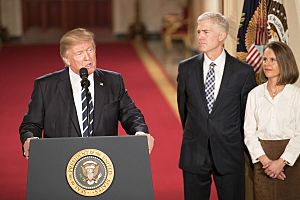
During the 2016 U.S. presidential election, candidate Donald Trump included Gorsuch, as well as his circuit colleague Timothy Tymkovich, in a list of 21 judges whom Trump would consider nominating to the Supreme Court if elected. After Trump took office in January 2017, unnamed advisers listed Gorsuch in a shorter list of eight, who they said were the leading contenders to be nominated to fill the seat left vacant by the death of Justice Antonin Scalia.
On January 31, 2017, Trump announced his nomination of Gorsuch to the Supreme Court. Gorsuch was 49 years old at the time of the nomination, making him the youngest nominee to the Supreme Court since the 1991 nomination of Clarence Thomas, who was 43. It was reported by the Associated Press that, as a courtesy, Gorsuch's first call after the nomination was to President Obama's pick for the same position, Merrick Garland, Chief Judge of the United States Court of Appeals for the District of Columbia Circuit. Obama had nominated Garland on March 16, 2016, but Senate Judiciary Committee chairman Chuck Grassley did not schedule a hearing for him, leaving Garland's nomination to expire on January 3, 2017. Senate majority leader Mitch McConnell invoked the so-called "Biden Rule" (of 1992) to justify the Senate's refusal to consider Garland's nomination in a general election year.
Trump formally transmitted his nomination to the Senate on February 1, 2017. The American Bar Association unanimously gave Gorsuch its top rating—"Well Qualified"—to serve as Associate Justice of the U.S. Supreme Court. His confirmation hearing before the Senate started on March 20, 2017.
On April 3, the Senate Judiciary Committee approved his nomination with a party-line 11–9 vote. On April 6, 2017, Democrats filibustered (prevented cloture) the confirmation vote, after which Republicans invoked the "nuclear option", allowing a filibuster of a Supreme Court nominee to be broken by a simple majority vote.
On April 7, 2017, the Senate confirmed Gorsuch's nomination to the Supreme Court by a 54–45 vote, with three Democrats (Heidi Heitkamp, Joe Manchin, and Joe Donnelly) joining all Republicans in attendance.
Gorsuch received his commission on April 8, 2017. He was sworn into office on Monday, April 10, 2017, in two ceremonies. The chief justice of the United States administered the constitutional oath of office in a private ceremony at 9 a.m. at the Supreme Court, making Gorsuch the 101st associate justice of the Court. At 11 a.m., Justice Kennedy administered the judicial oath of office in a public ceremony at the White House Rose Garden.
U.S. Supreme Court (2017–present)
Banking regulation
Gorsuch wrote his first U.S. Supreme Court decision for a unanimous court in Henson v. Santander Consumer USA Inc., 582 U.S. ___ (2017). The Court ruled against the borrowers, holding that Santander in this case was not a debt collector under the Fair Debt Collection Practices Act since it purchased the original defaulted car loans from CitiFinancial for pennies on the dollar, making Santander the owner of the debts and not merely an agent. When the act was enacted, regulations were put on institutions that collected other companies' debts, but the act left unaddressed businesses collecting their own debts.
First Amendment
Gorsuch joined the majority in National Institute of Family and Life Advocates v. Becerra and Janus v. AFSCME, which both held unconstitutional certain forms of compelled speech.
Gorsuch authored the majority opinion in Kennedy v. Bremerton School District (2022), which concerned a public high school football coach who was fired for praying on the field after games. The opinion held that the coach's conduct was protected by both the Free Speech and Free Exercise clauses of the First Amendment, and that the school's attempt to stop him was not mandated by the amendment's Establishment Clause.
LGBT rights
In 2017, in Pavan v. Smith, the Supreme Court "summarily overruled" the Arkansas Supreme Court's decision to deny same-sex married parents the same right to appear on the birth certificate. Gorsuch wrote a dissent, joined by Thomas and Alito, arguing that the Court should have fully heard the arguments of the case.
In 2020, Gorsuch wrote the majority opinion in the combined cases of Bostock v. Clayton County, Altitude Express Inc. v. Zarda, and R.G. & G.R. Harris Funeral Homes Inc. v. Equal Employment Opportunity Commission, ruling that businesses cannot discriminate in employment against LGBTQ people. He argued that discrimination based on sexual orientation was illegal discrimination on the basis of sex, because the employer would be discriminating "for traits or actions it would not have questioned in members of a different sex". The ruling was 6–3, with Gorsuch joined by Chief Justice Roberts and the Court's four Democratic appointees. Justices Thomas, Alito, and Kavanaugh dissented from the decision, arguing that it improperly extended the Civil Rights Act to include sexual orientation and gender identity.
In October 2020, Gorsuch agreed with the justices in an "apparently unanimous" decision to deny an appeal from Kim Davis, a county clerk who refused to issue marriage licenses to same-sex couples. In June 2021, he joined the justices in the unanimous Fulton v. City of Philadelphia decision, ruling in favor of a Catholic adoption agency that had been denied a contract by the City of Philadelphia due to the agency's refusal to adopt to same-sex couples. Gorsuch and Thomas joined Alito's concurrence, which argued for reconsidering, possibly overturning, Employment Division v. Smith, "an important precedent limiting First Amendment protections for religious practices." Also in 2021, Gorsuch was one of three justices, with Thomas and Alito, who voted to hear an appeal from a Washington State florist who had refused service to a same-sex couple based on her religious beliefs against same-sex marriage. In November 2021, Gorsuch dissented from the Court's 6–3 decision to reject an appeal from Mercy San Juan Medical Center, a hospital affiliated with the Roman Catholic Church, which had sought to deny a hysterectomy to a transgender patient on religious grounds. The decision to reject the appeal left in place a lower court ruling in the patient's favor; Thomas and Alito also dissented.
Second Amendment
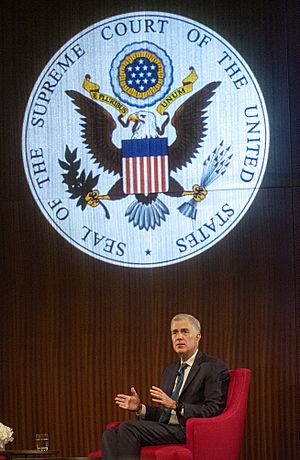
Gorsuch joined Thomas's dissent from denial of certiorari in Peruta v. San Diego County, in which the Ninth Circuit had upheld California's restrictive concealed carry laws.
Gorsuch wrote a statement regarding the denial of an application for a stay presented to Roberts in Guedes v. Bureau of Alcohol, Tobacco, Firearms, and Explosives, a 2019 D.C. Circuit case challenging the Trump administration's ban on bump stocks. In his statement Gorsuch criticized the Trump Administration's action as well as the justification the U.S. Court of Appeals for the D.C. Circuit used for upholding the ban.
Vagueness doctrine
In Sessions v. Dimaya (2018), the Supreme Court ruled 5–4 to uphold the Ninth Circuit's decision that the residual clause in the Immigration and Nationality Act was unconstitutionally vague. Gorsuch joined Justices Kagan, Ginsburg, Breyer, and Sotomayor in the opinion, and wrote a separate concurrence reiterating the importance of the vagueness doctrine within Scalia's 2015 opinion in Johnson. In United States v. Davis (2019), Gorsuch wrote the Opinion of the Court striking down the residual clause of the Hobbs Act based on the rationale used in Dimaya.
Native American law
Gorsuch is regarded as an authority on American Indian law. During his time on the Supreme Court, he has frequently affirmed tribal rights; his appointment to the Court was supported by multiple tribes and Native American organizations due to his favorable rulings as a Tenth Circuit judge.
In March 2019, Gorsuch joined the four liberal justices (in two plurality opinions) in a 5–4 majority in Washington State Dept. of Licensing v. Cougar Den, Inc. The Court's decision sided with the Yakama Nation, striking down a Washington state tax on transporting gasoline, on the basis of an 1855 treaty in which the Yakama ceded a large portion of Washington in exchange for certain rights. In his concurrence, which was joined by Ginsburg, Gorsuch ended his opinion by writing: "Really, this case just tells an old and familiar story. The State of Washington includes millions of acres that the Yakamas ceded to the United States under significant pressure. In return, the government supplied a handful of modest promises. The state is now dissatisfied with the consequences of one of those promises. It is a new day, and now it wants more. But today and to its credit, the Court holds the parties to the terms of their deal. It is the least we can do."
In May 2019, Gorsuch again joined the four more liberal justices in a decision favorable to Native Americans' treaty rights, signing on to Justice Sotomayor's opinion to reach a 5–4 decision in Herrera v. Wyoming. The case held that hunting rights in Montana and Wyoming, granted by the U.S. government to the Native American Crow people by an 1868 treaty, were not extinguished by the 1890 grant of statehood to Wyoming.
In July 2020, Gorsuch again joined the liberal justices to make a 5–4 majority in McGirt v. Oklahoma. The case considered whether much of eastern Oklahoma still remained under the jurisdiction of the "Five Civilized Tribes", given that the Native American Treaties that had designated the region as under their reservation status had never been dissolved by Congress, and, if so, whether crimes committed by Native Americans against other Native Americans on tribal land were under the jurisdiction of Native Courts. The landmark decision in the affirmative, written by Gorsuch, found that "For Major Crimes Act purposes, land reserved for the Creek Nation since the 19th century remains 'Indian country.'" In the opinion, he wrote: "Today we are asked whether the land these treaties promised remains an Indian reservation for purposes of federal criminal law. Because Congress has not said otherwise, we hold the government to its word." The case was later reviewed in the June 2022 case Oklahoma v. Castro-Huerta, which considered whether non-Natives who committed crimes against Natives on Native American territory can be charged under the sole jurisdiction of Native American tribal courts. While the state of Oklahoma had initially argued for the overturning of McGirt, the Court agreed to hear only issues relating to the impacts of McGirt. The 5-4 decision by Justice Brett Kavanaugh opposed the more expanded viewpoint of non-Native criminal jurisdiction, with the opinion giving jurisdiction over such crimes to both tribal and federal/state governments. Gorsuch derided the opinion in his dissent, writing, "Where this Court once stood firm, today it wilts."
On June 15, 2022, Gorsuch, Barrett, and the three liberal justices ruled in favor of the Native American Tribes of Texas in the case Ysleta del Sur Pueblo v. Texas. The case concerned a dispute over whether Texas could control and regulate gambling on Texan Native American reservations. The initial conflict had developed from the tribes' having been in a trust with Texas from 1968 to 1987 before being granted a federal trust, resulting in a statute governing the tribes' subjugation to Texas's gambling restrictions. The ruling emphasized that the tribes have the power to regulate electronic bingo games on their land regardless of the state's prohibition of non-prohibited gambling. Thus, as long as a game is not outright prohibited by the state of Texas, the state government cannot impose regulations upon tribal games. Gorsuch emphasized in his opinion that "None of this is to say that the Tribe may offer gaming on whatever terms it wishes [...] Other gaming activities are subject to tribal regulation and must conform to the terms and conditions set forth in federal law."
COVID-19 restrictions
On November 26, 2020, Gorsuch joined the majority opinion in Roman Catholic Diocese of Brooklyn v. Cuomo, which struck down COVID-19 restrictions imposed by the state of New York on houses of worship.
On May 18, 2023, Gorsuch issued a statement about the Court's decision to dismiss a lawsuit by several states aimed at continuing Title 42 expulsions of immigrants, a policy instituted to prevent the introduction of COVID-19 cases to the United States. His statement criticized many of the restrictions the government had imposed since the pandemic started and said, "Since March 2020, we may have experienced the greatest intrusions on civil liberties in the peacetime history of this country."
Legal philosophy
Gorsuch is a proponent of originalism, the idea that the Constitution should be interpreted as perceived at the time of enactment, and of textualism, the idea that statutes should be interpreted literally, without considering the legislative history and underlying purpose of the law. An editorial in the National Catholic Register opined that Gorsuch's judicial decisions lean more toward natural law philosophy.
In January 2019, Bonnie Kristian of The Week wrote that an "unexpected civil libertarian alliance" was developing between Gorsuch and Sotomayor "in defense of robust due process rights and skepticism of law enforcement overreach."
Voting alignment
FiveThirtyEight used Lee Epstein et al.'s Judicial Common Space scores (which are not based on a judge's behavior, but rather the ideology scores of either home state senators or the appointing president) to find a close alignment between the conservatism of other appellate and Supreme Court judges such as Kavanaugh, Thomas, and Alito. The Washington Post's statistical analysis estimated that the ideologies of most of Trump's announced candidates were "statistically indistinguishable" and also associated Gorsuch with Kavanaugh and Alito.
Judicial activism
In a 2016 speech at Case Western Reserve University, Gorsuch said that judges should strive to apply the law as it is, focusing backward, not forward, and looking to text, structure, and history to decide what a reasonable reader at the time of the events in question would have understood the law to be—not to decide cases based on their own moral convictions or the policy consequences they believe might serve society best.
Federalism and state power
Justin Marceau, a professor at the University of Denver's Sturm College of Law, called Gorsuch "a predictably socially conservative judge who tends to favor state power over federal power". Marceau added that this is important because federal laws have been used to try to reel in "rogue" state laws in civil rights cases.
Personal life
Gorsuch and his wife, Marie Louise Gorsuch, a British citizen, met at Oxford. The two married at St. Nicholas' Anglican Church in Henley-on-Thames in 1996. They live in Boulder, Colorado, and have two daughters.
Gorsuch enjoys the outdoors and fly fishing; he went fly fishing on at least one occasion with Justice Scalia. He raises horses, chickens, and goats, and often arranges ski trips with colleagues and friends.
He has authored two nonfiction books. He is a co-author of The Law of Judicial Precedent, published by Thomson West in 2016.
In 2017, after his announcement as a Supreme Court nominee, the New York Times reported that Gorsuch owned a timeshare outside Granby, Colorado, with associates of Philip Anschutz, that was later sold the same year. Reporting from Politico in April 2023 revealed that Gorsuch had sold the cabin to Brian Duffy, the CEO of the law firm Greenberg Traurig, which litigates cases before the Supreme Court, but failed to disclose the purchaser's identity on his federal disclosure forms. The property was listed for sale for a few years but did not go under contract until the week after Gorsuch joined the Supreme Court. Since 2017, Greenberg Traurig has been involved in at least 22 cases before or presented to the Supreme Court.
Gorsuch has been active in several professional associations throughout his legal career, including the American Bar Association, the American Trial Lawyers Association, Phi Beta Kappa, the Republican National Lawyers Association, and the New York, Colorado, and District of Columbia Bar Associations. In May 2019, it was announced that Gorsuch would become the new chairman of the board of the National Constitution Center, succeeding former vice president Joe Biden.
Religion
Gorsuch was the first member of a mainline Protestant denomination to sit on the Supreme Court since the retirement of John Paul Stevens in 2010. He and his two siblings were raised Catholic and attended weekly Mass. His wife, Louise, is British-born; the two met while Neil was studying at Oxford. Louise was raised in the Church of England.
When the couple returned to the United States they joined Holy Comforter, an Episcopal parish in Vienna, Virginia, attending weekly services. Gorsuch volunteered there as an usher. The Gorsuch family later attended St. John's Episcopal Church in Boulder, Colorado, a liberal church with a longstanding open-door policy for the LGBT community. During his 2017 confirmation hearing, responding to a senator's question about his faith, Gorsuch replied, "I attend an Episcopal church in Boulder with my family, senator." After marrying in a non-Catholic ceremony and joining an Episcopal church, Gorsuch has not publicly clarified his religious affiliation.
Awards and honors
Gorsuch received the Edward J. Randolph Award for outstanding service to the Department of Justice and the Harry S. Truman Foundation's Stevens Award for outstanding public service in the field of law.
Selected works
Articles
Also published as: Cato Institute Policy Analysis No. 178 (1992).
Transcript published by The Georgetown Journal of Legal Ethics. 18: 1197.
See also
 In Spanish: Neil Gorsuch para niños
In Spanish: Neil Gorsuch para niños
- List of law clerks of the Supreme Court of the United States (Seat 1)
- List of law clerks of the Supreme Court of the United States (Seat 6)
Videos
- Law's Irony lecture as given at the Federalist Society (video 29 min.) YouTube.


